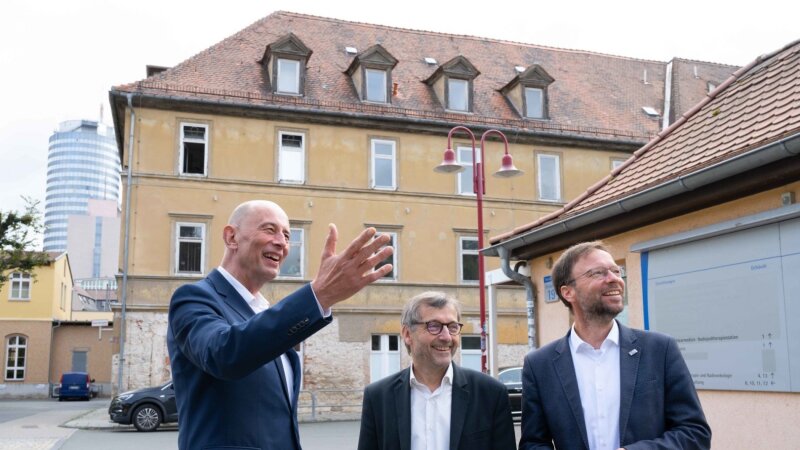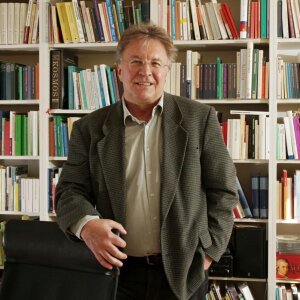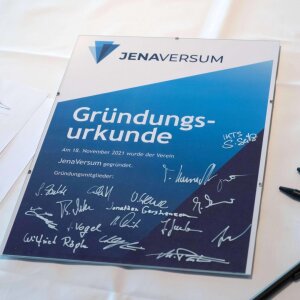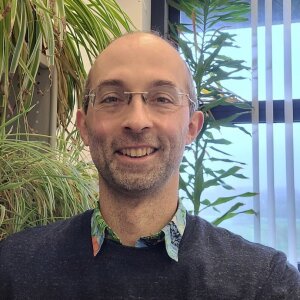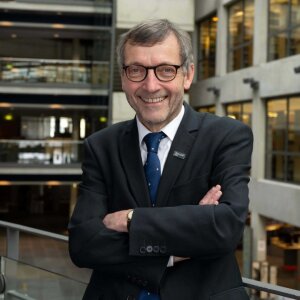News
New science campus
The State of Thuringia and the University of Jena have agreed to build new premises for biomedical research and teaching on the former hospital grounds on Bachstraße.
The plot of land on Bachstraße will continue to be used for university purposes in the future. This was recently announced by Thuringia’s Minister of Science, Wolfgang Tiefensee, the Lord Mayor of Jena, Dr Thomas Nitzsche and University President, Prof. Dr Walter Rosenthal.
An inner-city science campus is planned with a special focus on biomedical departments such as Pharmacy, Nutritional Sciences, Pharmacology and Physiology. The aim is to establish a closer link between urban and academic life.
Bachstraße is located in the immediate vicinity of Jena city centre. The street is lined with large buildings from different eras that shape the cityscape. The plot is 39,000 square metres in size. Most of the land is owned by the State of Thuringia, while other areas belong to the University Hospital and a small amount is the property of the Ernst Abbe Foundation.
The state is planning to finance the construction work through the European Regional Development Fund (ERDF). [PM]
Thuringia’s Minister of Science, Wolfgang Tiefensee (pictured left), the Lord Mayor of Jena, Dr Thomas Nitzsche (right) and University President, Prof. Dr Walter Rosenthal.
Image: Jens Meyer (University of Jena)»Jena Declaration« signed
Prof. Dr Benno Werlen from the UNESCO Chair on Global Understanding for Sustainability at the University of Jena
Image: Jan-Peter Kasper (University of Jena)International network has urged for a change in strategy to achieve UN Sustainable Development Goals.
When the United Nations adopted the 2030 Agenda six years ago, the member states committed themselves to creating a more sustainable world. They set themselves a total of 17 individual goals such as »no poverty«, »quality education«, »good health and well-being« and »responsible consumption and production«. However, they seem to be a long way off achieving their goals.
That’s why a network of renowned institutions is now calling for a clear change of strategy. On the initiative of Prof. Dr Benno Werlen from the UNESCO Chair on Global Understanding for Sustainability at the University of Jena, over 30 institutions have signed the »Jena Declaration«, in which they define a new cultural approach to achieving the Sustainable Development Goals. [PM]
»JenaVersum« founded
Founding charter with the signatures of all actors in the new network »JenaVersum«.
Image: Jens Meyer (University of Jena)More than 20 partners from science, business and the local community have come together.
When »JenaVersum e. V.« was founded on 18 November 2021, this marked the start of a new chapter in Jena’s cooperation history. The new network aims to promote research collaboration on site, to raise Jena’s profile as a science and business location around the world, and to strengthen interactions with society. In addition to the University of Jena, the »JenaVersum« brings together the University of Applied Sciences Jena, the University Hospital, non-university research institutions and foundations, partners from the city and research-related companies.
»As a university with traditionally close ties to the city and all local partners in the field of research, we’re very much interested in maintaining this network and expanding our fruitful cooperation,« says Prof. Dr Walter Rosenthal, who is both the President of the University of Jena and Chairman of the »JenaVersum« association. [PM]
Humboldt Professorship
Prof. Dr Bas E. Dutilh
Image: privatGermany’s highest funded research award goes to the new Professor of Viral Ecology, Prof. Dr Bas E. Dutilh.
Prof. Dr Bas E. Dutilh is one of ten researchers throughout Germany to be awarded an Alexander von Humboldt Professorship. The award includes up to five million euros in prize money and is financed by the Federal Ministry of Education and Research (BMBF).
Dutilh specializes in modelling microbial balance and is investigating the role played by viruses within this system. His new Professorship of Viral Ecology at the University of Jena is part of the »Balance of the Microverse« cluster of excellenceExternal link.
Pioneer of virus discovery
Over the past ten years, Dutilh has established himself as a pioneer in the field of virus discovery with the help of metagenomics. Since 2018, he has been one of the most cited experts in this field around the world, as confirmed by his current ranking within the »Highly Cited Researchers«. Dutilh has recently been given an ERC Consolidator Grant, facilitating his move from Utrecht University in the Netherlands to Jena. He is looking forward to expanding the scope of his computer-aided research in a new research environment and developing high-throughput experiments in a brand-new laboratory. As part of the Alexander von Humboldt Professorship, he will focus on combining his work in the field of virus discovery with his line of research on microbiome modelling. [NB]
HRK vice-president
Prof. Dr Walter Rosenthal, the President of the University of Jena
Image: Jens Meyer (University of Jena)Prof. Dr Walter Rosenthal in charge for research
The German Rectors’ Conference (HRK) elected its vice-presidents in November 2021. As one of ten members of the Executive Board, Prof. Dr Walter Rosenthal, the President of the University of Jena, is now responsible for research, academic career paths and transfer. Rosenthal wants to further improve the conditions for researchers in Germany, from basic research to production, in order to offer German universities the best possible support on the international stage. [KBB]
Research Training Group on artificial intelligence
The Carl Zeiss Foundation is funding computer scientists with a total of 4.9 million euros over the next six years as part of an initiative called »Scientific Breakthroughs in Artificial Intelligence«.
The new »Interactive Inference« Research Training Group will be launched in April 2022 to examine probabilistic models and draw conclusions from them using data. The aim is to improve the reliability of artificial intelligence, which is now used in many areas of society such as medicine, business and science. The focus will be on the development of algorithms that have verifiable guarantees and make effective use of the properties of modern computer hardware. »Our aim is to develop algorithms that make it possible to draw conclusions from large volumes of data and for complex models,« explains Prof. Dr Joachim Giesen, one of the spokespersons for the Research Training Group. »We’re combining exact algorithms that can ensure the best decision based on the state of the data and the possibilities of a model, as well as approximating algorithms that scale better to large volumes of data and complex models«.
This topic will be addressed from different perspectives by two groups, each with seven doctoral candidates. The team members come from the fields of machine learning, artificial intelligence, advanced computing, logic, visualization, bioinformatics and theoretical biology. [sh]
